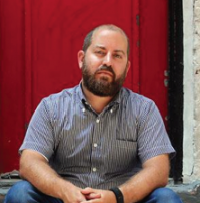In a recent interview with The Nation about his new novel, The Nickel Boys, Colson Whitehead was asked what he thought about white fiction writers taking on race as a theme. He spoke approvingly of the practice. “I actually endorse stepping outside of your cultural home,” he said. “You should write across race and class and gender, and as long as you don’t screw it up, you should do whatever you want. Kudos to anybody who’s tackling how we live in this country.”
As long as you don’t screw it up leaps out of that quote as if it were written in flashing hot-pink neon. The debates over cultural appropriation have become so intense (“My culture is NOT your goddamn prom dress”), absurd (Ms. Shriver, please remove that sombrero) and unsettling to writers and publishers (pick your recent YA foofaraw) that any writer writing outside their experience will have to work through what it means to not screw it up.
 And screw it up we have — and by “we,” I mean white writers. As Jess Row argues in White Flights, his provocative, tentatively hopeful clutch of essays about how white writers have and haven’t addressed race, we’re still often locked in Magical Negro mode. “Black characters are so often expelled from American narratives: as glimpsed figures of moral authority or emblems of a characters’ bad conscience, but always as what Henry James called the ficelle, an instrumental figure with no central dramatic significance,” he writes.
And screw it up we have — and by “we,” I mean white writers. As Jess Row argues in White Flights, his provocative, tentatively hopeful clutch of essays about how white writers have and haven’t addressed race, we’re still often locked in Magical Negro mode. “Black characters are so often expelled from American narratives: as glimpsed figures of moral authority or emblems of a characters’ bad conscience, but always as what Henry James called the ficelle, an instrumental figure with no central dramatic significance,” he writes.
As a white novelist, Row has tried to face this — what might you call it? Neglect? Condescension? Racism?– head-on: His 2015 novel, Your Face in Mine, used the invention of “racial reassignment surgery” to explore race and identity in American society. But for anybody who comes to White Flights in the context of the current debate over appropriation, it’s important to know that Row isn’t delivering a craft talk about how to write about race, with explicit guidance on how not to screw it up. His main point is a trickier and more provocative one: White writers who avoid race are effectively writing about it; the absence of race simply revels their racial anxiety. The absences in their prose — and the critical approval of that prose — reveals how what’s approved in American literary culture generally elevates whiteness.
“It often seems like there are two American literatures: one in which race is always marked, and almost always tied to the identity of the author, and one in which race seems to play no part at all,” he writes. “I don’t think this is actually the case: stories not only deny but undeny, tell but untell themselves.” Much of the book is built around examples of this kind of untelling, places where race is elided, subsumed, or reframed in a way that normalizes whiteness and others everything else. In Annie Dillard’s An American Childhood, for instance, Row detects an effort to sideline her father’s interactions with black people, to better support a less complicated narrative about her adolescence. (“She has sealed off from herself both the secret and the public lives of black people, as a necessary step in achieving her own imaginative selfhood.”) Jonathan Franzen has absented race from his novels in favor of highlighting an emphasis on systems. (The Corrections is Row’s main target for this point, but a better example might be Franzen’s debut novel, The Twenty-Seventh City, in which Saint Louis acquires an Indian police chief for no apparent reason besides cultivating a quirky, pop-pomo exoticism.)
 Writers like David Foster Wallace and Don DeLillo, Row argues, have undertaken similar missions — Wallace more directly by arguing for standard written (read: white) English, DeLillo more subtly by stripping out racial identity from much of his work, up to and including his own Italian upbringing. “DeLillo is a writer who has escaped race and locality, who never betrays an ‘ethnic consciousness,’ who has become perfectly national, plural, ‘essential’ — over a body of work that obsessively picks apart the certainties those narratives require,” he writes. But Row’s most considered assessment — it shades toward an attack, though that’s not really Row’s temperament — is of editor and writer Gordon Lish. His heavy editorial hand with Raymond Carver, excising anything that smacked of his lower-middle-class background, represented “an aesthetic form of boundary policing, a kind of symbolic violence,” he writes. And because Lish has been such a storied and respected teacher, that policing has launched generation of proteges whom Row notes are almost entirely white. “What concerns me — because I was taught it, and absorbed it, long before I’d ever heard his name — is how his aesthetic so easily translates into a radical practice of shame, rooted in the white body, that makes it so difficult for white writers to recognize race at all.”
Writers like David Foster Wallace and Don DeLillo, Row argues, have undertaken similar missions — Wallace more directly by arguing for standard written (read: white) English, DeLillo more subtly by stripping out racial identity from much of his work, up to and including his own Italian upbringing. “DeLillo is a writer who has escaped race and locality, who never betrays an ‘ethnic consciousness,’ who has become perfectly national, plural, ‘essential’ — over a body of work that obsessively picks apart the certainties those narratives require,” he writes. But Row’s most considered assessment — it shades toward an attack, though that’s not really Row’s temperament — is of editor and writer Gordon Lish. His heavy editorial hand with Raymond Carver, excising anything that smacked of his lower-middle-class background, represented “an aesthetic form of boundary policing, a kind of symbolic violence,” he writes. And because Lish has been such a storied and respected teacher, that policing has launched generation of proteges whom Row notes are almost entirely white. “What concerns me — because I was taught it, and absorbed it, long before I’d ever heard his name — is how his aesthetic so easily translates into a radical practice of shame, rooted in the white body, that makes it so difficult for white writers to recognize race at all.”
Row is raising a set of complicated but valuable points, and because his approach is more seeking and open-ended, it doesn’t have the force of a jeremiad or manifesto. Nor is it a marshaling of evidence. White Flights might best be described as a lament: Here we have a country with a rich ethnic and racial background, and our most acclaimed white writers seem to be strenuously laboring to avoid it. Row himself openly struggles to find a way into the issue, posing questions to himself about whether he’s framing these issues in the right way, belaboring one point, neglecting another. He worries that he’s overreaching, and perhaps sometimes he is, or laboring to prove a negative. Can emo really be “about the white body trying to escape itself … the white body dreaming of becoming brown or black?” Was Dillard really sweeping blackness under the rug or simply giving a moment in her father’s life its proper, modest due? Are the abstractions in DeLillo simply matters of philosophical approach and racial elision? And perhaps most importantly: What might the “reparative writing” Row advocates for look like?
 Row’s book is a valuable starting point for a conversation that not enough writers — OK, white critics — are having. And its open-endedness, its refusal to simplify or be prescriptive, is to its credit, even if it’s frustrating. Simplification has led to critics stuck in a habit of thinking of America’s literary Jonathans (Foer, Franzen, Lethem, etc.) as literary standard-bearers and writers like of Jesmyn Ward, Colson Whitehead, etc. as great black writers, regardless of how many Pulitzers and NBAs they accrue. Whether “identity politics” is closing or expanding this divide is worth a book in itself, but what’s certain is that it’s given some white writers an opening to keen about being excommunicated from literary culture (a demonstrably false assertion) rather than discuss what an inclusive and engaged literary culture might look like. White writers will need to commit “not to panic, overread, or catastrophize,” Row writes. “For white people, at least the white people I know, this is counterintuitive. It takes work.”
Row’s book is a valuable starting point for a conversation that not enough writers — OK, white critics — are having. And its open-endedness, its refusal to simplify or be prescriptive, is to its credit, even if it’s frustrating. Simplification has led to critics stuck in a habit of thinking of America’s literary Jonathans (Foer, Franzen, Lethem, etc.) as literary standard-bearers and writers like of Jesmyn Ward, Colson Whitehead, etc. as great black writers, regardless of how many Pulitzers and NBAs they accrue. Whether “identity politics” is closing or expanding this divide is worth a book in itself, but what’s certain is that it’s given some white writers an opening to keen about being excommunicated from literary culture (a demonstrably false assertion) rather than discuss what an inclusive and engaged literary culture might look like. White writers will need to commit “not to panic, overread, or catastrophize,” Row writes. “For white people, at least the white people I know, this is counterintuitive. It takes work.”
Row isn’t calling this behavior racism, exactly, so much as white writers having the wrong conversation. Directing attention to online scrapes about appropriation is arming up for the wrong front. Better, Row suggests, to do the thing that writers are supposed to do, which is to look at the world — the whole world — and help readers see it anew. To do that, he wants us to recognize that what we’ve called “natural” and “realistic” are often effects, a reshaping of society that’s different from the one we’re in. “Novels are more like ritual than professional readers imagine them to be; more performative, in ways that are hard to predict,” he cautions critics. Recognizing that performative nature is a first step. What’s required to change the nature and breadth of the performances will require plenty more.
[Published August 6, 2019 by Graywolf Press. 320 pages, $16.00 paperback]